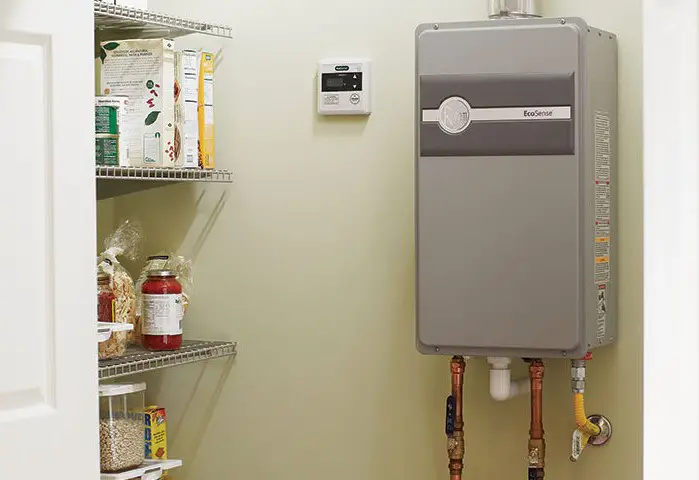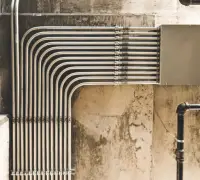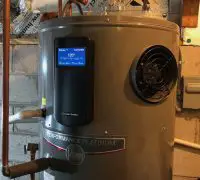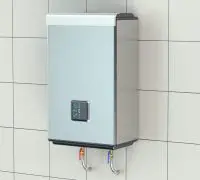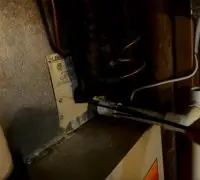If you're looking to fix or replace your Heating or A/C system, we can connect you with a reliable and cost-effective professional in your area.
Traditional water heaters with tanks have been available for many years now. Even if you don’t know much, at least you know that they’re expensive and not quite efficient. Despite a tank’s insulation, the water will still lose the temperature. You need a lot of energy to keep the water hot throughout the day, and your utility bill is emptying your wallet.
Page Table of Contents
Why should you even consider a tankless water heater?
Tankless water heaters have been created for avoiding the downsides of traditional heaters with tanks. They’re more energy-efficient since they only give hot water on demand and don’t need energy for maintaining the water warm until you use it.
An overwhelming majority of tankless water heaters are small and compact, requiring 1/3of the space of a 10-gallon tank.
With no tank to collect the water, tankless water heaters present a lower risk for corrosion. They’re more durable and more comfortable to maintain than the traditional opponents. Flushing once a year and using a water softener may be enough when it comes to taking care of a tankless water heater.
On top of it all, you can choose between centrally-located whole house heaters and point-of-use heaters for fixtures. Either way, the options are plenty, so you should keep reading for finding the best way of choosing a tankless water heater.
What’s the best way to find out about your household demands?
Fundamentally, you know the hot water demands in your household before buying a tankless water heater. How much has the incoming cold water had to be heated? What’s the hot water you need at peak demand?
It may sound complicated, but it’s actually a lot simpler. You need to write down the fixtures using hot water from the tankless water heater, adding up all the flow rates. Ideally, any fixture in your home comes with documentation where you can find out the flow rate. When you don’t have it anymore or have no idea about it, you may always go with the general guidance:
- Low-flow showerheads: 1.2-2GPM
- Faucets- 0/75-2.5GPM
- Old standard shower heads: 2.5-3.5GPM
- Dishwasher and washing machine: 1-2GPM
In the case of old fixtures, it’s always wiser to go with the higher numbers. Go with the smaller numbers instead of the new fixtures. When you’re not sure about the age of your fixtures, you should go with a higher flow rate. You don’t want to select an undersized water heater that cannot sustain your hot water demands.
Side note: You can obtain an accurate number on the flow rate by timing a fixture as it fills a gallon jug.
Pay attention to the temperature of incoming water too!
The temperature of incoming water is also essential for the performance of your tankless water heater. You can find online maps of average U.S. groundwater temperatures. Even if the cold may differ in real life, the rough guide is a useful starting point when selecting your tankless water heater. You can always get in touch with your water provider if you’re looking for better precision.
When you have the number on the incoming water temperature, you may find out the temperature increase. That is, how much will the heater has to heat the cold water. 120F degrees for water is enough for most households, with many units heating up to 160F degrees. You need to subtract the incoming water temp from the output temperature you want. If the incoming water is 52F degrees and you want to have 120F degrees hot water, the temperature rise will be 70F degrees.
Most units come with tables/charts about the specs, the maximum flow rate at different temperatures rises, and so on. Ideally, you want a tankless water heater that provides the wanted flow rate at the temperature rise you need. A high flow rate means that the temperature will increase lower.
Should you go with electric models?
If you decide to select an electric tankless water heater, you need to check if the electrical system in your household supports the load. The wire size for powering the water heater should also be safe and enough.
Electric models are reliable for point of use, and people avoid the units for whole-house applications on the cause of high electricity bills and expensive upgrades inside the home.
Most of the time, an electric tankless water heater specified the number and amperage of the breaker needed for running it. The majority of the home has 100-200 amp electrical service, which may be enough for point-of-use heaters. A small household can also benefit from an electric tankless water heater without upgrading the electrical service.
The best part about the electric models is that they don’t need venting. This little detail actually saves you a lot of money, time, and space. It even allows you to install more units inside your home.
Should you select a natural gas or a propane unit?
Gas and LP tankless water heaters are stronger than the electric opponents. As a matter of fact, they’re the most popular users within the tankless water heaters category. However, you still have to decide if the gas supply is enough for powering the water heater. Do you also need to think about how you will eliminate the exhaust the heater causes?
You need to take the size of the gas supply line into consideration. The distance between the heater and the meter is also significant. Is the pipe size smaller on its course to the heater? How much gas is used in your home per se? You can find out the answers on your own, or you can call your gas provider or a certified plumber. They’re the best at knowing all the details counting for your gas tankless water heater.
When your gas supply is undersized, you may have to install larger-diameter pipes for gaining more fuel. The provider may also have to raise the supply pressure to your household, which can only add to the spending. Make sure you have a couple of hundreds prepared for regulator/meter change and even more for repiping in your home.
No matter the final choice, look for a gas tankless water heater that comes with electronic ignition so that you don’t use any more fuel on a pilot light.
One final advice
Don’t forget to look into outdoor tankless water heaters and condensing units. The latter is quite the ultimate in terms of efficiency. No matter the final choice, one thing is sure: never go shopping without doing your bits and bobs first.
We can definitely connect you with a trusted provider in your area to repair, replace or maintain your heating and A/C systems. Why not let us find a professional for you?
